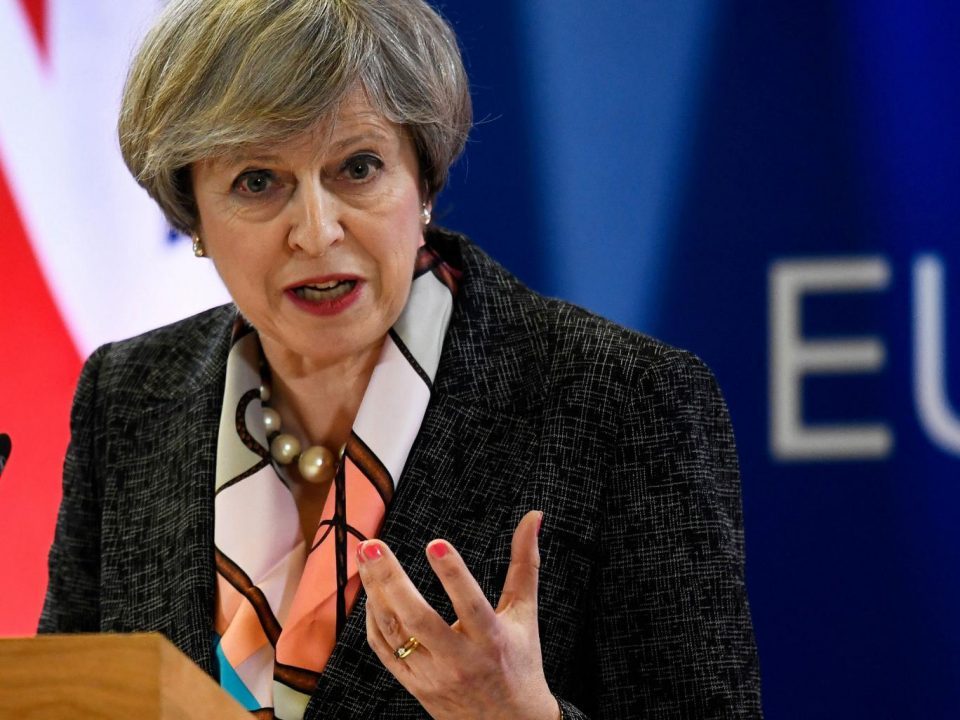Prime Minister Theresa May on Monday rejected calls to delay Britain’s departure from the European Union, and said her Plan B was to get her rejected Brexit deal approved by Parliament after securing changes to a contentious Irish border measure, AP reported.
Outlining what she plans to do after her EU divorce deal was rejected by Parliament last week, May said that she had heeded lawmakers’ concerns over an insurance policy known as the “backstop” that is intended to guarantee there are no customs checks along the border between EU member Ireland and the U.K.’s Northern Ireland after Brexit.
May said she would be “talking further this week to colleagues … to consider how we might meet our obligations to the people of Northern Ireland and Ireland in a way that can command the greatest possible support in the House.
“And I will then take the conclusions of those discussions back to the EU.”
The bloc insists that it won’t renegotiate the withdrawal agreement.
“This is the text we all invested ourselves in,” Austrian Foreign Minister Karin Kneissl said at a meeting of EU ministers in Brussels.
British lawmakers are due to debate and vote on May’s revised plan — and possible amendments — on Jan. 29, exactly two months before Britain is due to leave the EU.
Opposition leader Jeremy Corbyn of the Labour Party said that May’s Plan B was just a second attempt to push through her doomed deal.
“This really does feel a bit like ‘Groundhog Day,’” he said, referring to the 1993 film starring Bill Murray, in which a weatherman is fated to live out the same day over and over again.
Britain and the EU sealed a divorce deal in November after months of tense negotiations. But the agreement has been rejected by both sides of Britain’s divide over Europe. Brexit-backing lawmakers say it will leave the U.K. tethered to the bloc’s rules and unable to forge an independent trade policy. Pro-Europeans argue it is inferior to the frictionless economic relationship Britain currently enjoys as an EU member.
After her deal was thrown out last week by a crushing 432-202 vote in Parliament, May said she would consult with lawmakers from all parties to find a new way forward.
But Corbyn called the cross-party meetings a “stunt,” and other opposition leaders said the prime minister didn’t heed their entreaties to rule out a “no-deal” Brexit and retain close economic ties with the EU.
On Monday, May rejected calls from pro-EU lawmakers to delay Britain’s departure from the bloc or to hold a second referendum on whether to leave.
She made some concessions to opposition demands, including waiving a 65 pound ($84) fee for EU citizens in Britain who want to stay permanently after Brexit.
But May’s main goal is to win over pro-Brexit Conservatives and her party’s Northern Irish ally, the Democratic Unionist Party. Both groups say they won’t back the deal unless the border backstop is removed.
The backstop proposes to keep the U.K. in a customs union with the EU in order to avoid checks and border infrastructure between Northern Ireland and Ireland. It is meant as a temporary measure that would last until a permanent solution is found. But pro-Brexit U.K. lawmakers fear Britain could become trapped in it, indefinitely bound by EU trade rules.
Polish Foreign Minister Jacek Czaputowicz broke ranks with EU colleagues Monday by suggesting the problem could be solved by setting a five-year time limit on the backstop.
The idea got a cool reception. Irish Foreign Minister Simon Coveney said that “putting a time-limit on an insurance mechanism, which is what the backstop is, effectively means that it’s not a backstop at all.”
Britain’s political impasse over Brexit is fueling concerns that the country may crash out of the EU on March 29 with no agreement in place to cushion the shock. That could see tariffs imposed on goods moving between Britain and the EU, sparking logjams at ports and shortages of essential supplies.
Several groups of lawmakers are trying to use parliamentary rules and amendments to May’s plan to block the possibility of Britain leaving the EU without a deal.
One of those legislators, Labour’s Yvette Cooper, said May was shirking her responsibility to the country by refusing to take “no deal” off the table.
“I think she knows that she should rule out ‘no deal’ in the national interest because it would be so damaging,” Cooper told the BBC. “She’s refusing to do so, and I think she’s hoping that Parliament will do this for her. That is not leadership.”
EU leaders, meanwhile, expressed frustration with British indecision.
“We now know what they don’t want in London,” German Foreign Minister Heiko Maas said. “Now we must at last find out what they want.”
Chief EU Brexit negotiator Michel Barnier said that while the EU wouldn’t amend the legally binding withdrawal agreement, it was ready to adjust the political declaration — a non-binding statement on future relations that forms the second part of the divorce deal.
Spanish Foreign Affairs Minister Josep Borrell said it was crucial to find out what type of deal Britain’s Parliament would support.
“We cannot keep negotiating something this way and when everything is negotiated, the U.K. Parliament refuses,” he said in Brussels. “We have to have the guarantee that the proposal has the parliamentary support not to be refused again.”





Comments are closed for this post.